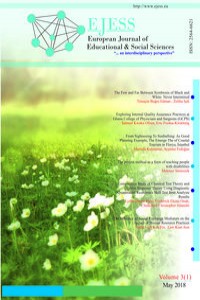Abstract
The
paper aims at presenting a look at ways,
and forms of using the project method in teaching people with disabilities. I will analyze the
usefulness of the project method in different areas of education of people with
disabilities. The study also briefly comments on the most significant features
that describe educational projects. Subsequently, it will go on to benefits of
using the project method in education. The paper focuses primarily on how the
project as an element of teaching affects the development of students with
disabilities. In the further part of the work, it will also consider forms of project in education. The last part of the paper mentions several
important results of research which pertain to the possibility of using project
method technologies in education.
References
- Buchnat, M., (2013). Metoda projektów płaszczyzną inkluzji dla dzieci z lekką niepełnosprawnością intelektualną. [The project method as the plane of inclusion for children with mild intellectual disability]. Interdyscyplinarne Konteksty Pedagogiki Specjalnej 3, 31 - 44 .
- Chałas, K., (2000). Metoda projektów i jej egzemplifikacja w praktyce [The project method and its exemplification in practice] Warsaw, Poland: Wydawnictwo Nowa Era.
- Dykcik, W., & Szychowiak B., (2002). Nowatorskie i alternatywne metody w praktyce pedagogiki specjalnej [Innovative and alternative methods in the practice of special education]. Poznań, Poland: Wydawnictwo Naukowe UAM.
- Kamps, D.M., Barbetta, P.M., Leonard, B.R. and Delquadri, J. (1994). Classwide peer tutoring: an integration strategy to improve reading skills and promote peer interactions among students with autism and general education peers. Journal of Applied Behavior Analysis 27, 49 -61.
- Kilpatrick, W. H., (1918). The Project Method: The Use of the Purposeful Act in the Education Process. Teachers College Record 19, 319 – 335.
- McCorry, K. J., (2008). Zorganizuj się! Jak usprawnić pracę w biurze [Get organized! How to improve work in the office]. Gdańsk, Poland: Gdańskie Wydawnictwo Psychologiczne.
- Potocka, B., Nowak, L., (2002). Projekty edukacyjne: poradnik dla nauczycieli [Educational projects: guide for teachers]. Kielce Poland:, Zakład Wydawniczy SFS.
- Roy, E., (2015) When we design for disability, we all benefit. TEDxMidAtlantic. Available fromhttps://www.ted.com/talks/elise_roy_when_we_design_for_disability_we_all_benefit.
- Self, H., Benning, A., Marston, D. and Magnusson, D. (1991). Cooperative teaching project: a model for students at risk, Exceptional Children 58, 26 - 34.
- Stankiewicz, P., (2015). Moving schools closer to the world of science : innovative solutions for education from the "Eduscience" project. Warsaw : Instytut Geofizyki PAN.
- Stevens, R.J. and Slavin, R.E. (1995). Effects of a cooperative learning approach in reading and writing on academically handicapped and nonhandicapped students, The Elementary School Journal 95, 241 - 262.
- Szymański, M. S., (2000). O metodzie projektów [About the project method]. Warsaw, Poland: Wydawnictwo Akademickie “Żak”.
- Zhylkybay, G., Magzhan, S., Suinzhanova Z., Balaubekov M., Adiyeva P., (2014). The Effectivness of Using the Project Method in the Teaching Process. Procedia - Social and Behavioral Sciences 143, 621 – 624.
Abstract
References
- Buchnat, M., (2013). Metoda projektów płaszczyzną inkluzji dla dzieci z lekką niepełnosprawnością intelektualną. [The project method as the plane of inclusion for children with mild intellectual disability]. Interdyscyplinarne Konteksty Pedagogiki Specjalnej 3, 31 - 44 .
- Chałas, K., (2000). Metoda projektów i jej egzemplifikacja w praktyce [The project method and its exemplification in practice] Warsaw, Poland: Wydawnictwo Nowa Era.
- Dykcik, W., & Szychowiak B., (2002). Nowatorskie i alternatywne metody w praktyce pedagogiki specjalnej [Innovative and alternative methods in the practice of special education]. Poznań, Poland: Wydawnictwo Naukowe UAM.
- Kamps, D.M., Barbetta, P.M., Leonard, B.R. and Delquadri, J. (1994). Classwide peer tutoring: an integration strategy to improve reading skills and promote peer interactions among students with autism and general education peers. Journal of Applied Behavior Analysis 27, 49 -61.
- Kilpatrick, W. H., (1918). The Project Method: The Use of the Purposeful Act in the Education Process. Teachers College Record 19, 319 – 335.
- McCorry, K. J., (2008). Zorganizuj się! Jak usprawnić pracę w biurze [Get organized! How to improve work in the office]. Gdańsk, Poland: Gdańskie Wydawnictwo Psychologiczne.
- Potocka, B., Nowak, L., (2002). Projekty edukacyjne: poradnik dla nauczycieli [Educational projects: guide for teachers]. Kielce Poland:, Zakład Wydawniczy SFS.
- Roy, E., (2015) When we design for disability, we all benefit. TEDxMidAtlantic. Available fromhttps://www.ted.com/talks/elise_roy_when_we_design_for_disability_we_all_benefit.
- Self, H., Benning, A., Marston, D. and Magnusson, D. (1991). Cooperative teaching project: a model for students at risk, Exceptional Children 58, 26 - 34.
- Stankiewicz, P., (2015). Moving schools closer to the world of science : innovative solutions for education from the "Eduscience" project. Warsaw : Instytut Geofizyki PAN.
- Stevens, R.J. and Slavin, R.E. (1995). Effects of a cooperative learning approach in reading and writing on academically handicapped and nonhandicapped students, The Elementary School Journal 95, 241 - 262.
- Szymański, M. S., (2000). O metodzie projektów [About the project method]. Warsaw, Poland: Wydawnictwo Akademickie “Żak”.
- Zhylkybay, G., Magzhan, S., Suinzhanova Z., Balaubekov M., Adiyeva P., (2014). The Effectivness of Using the Project Method in the Teaching Process. Procedia - Social and Behavioral Sciences 143, 621 – 624.
Details
| Primary Language | English |
|---|---|
| Subjects | Studies on Education |
| Journal Section | Articles |
| Authors | |
| Publication Date | May 26, 2018 |
| Published in Issue | Year 2018 Volume: 3 Issue: 1 |


